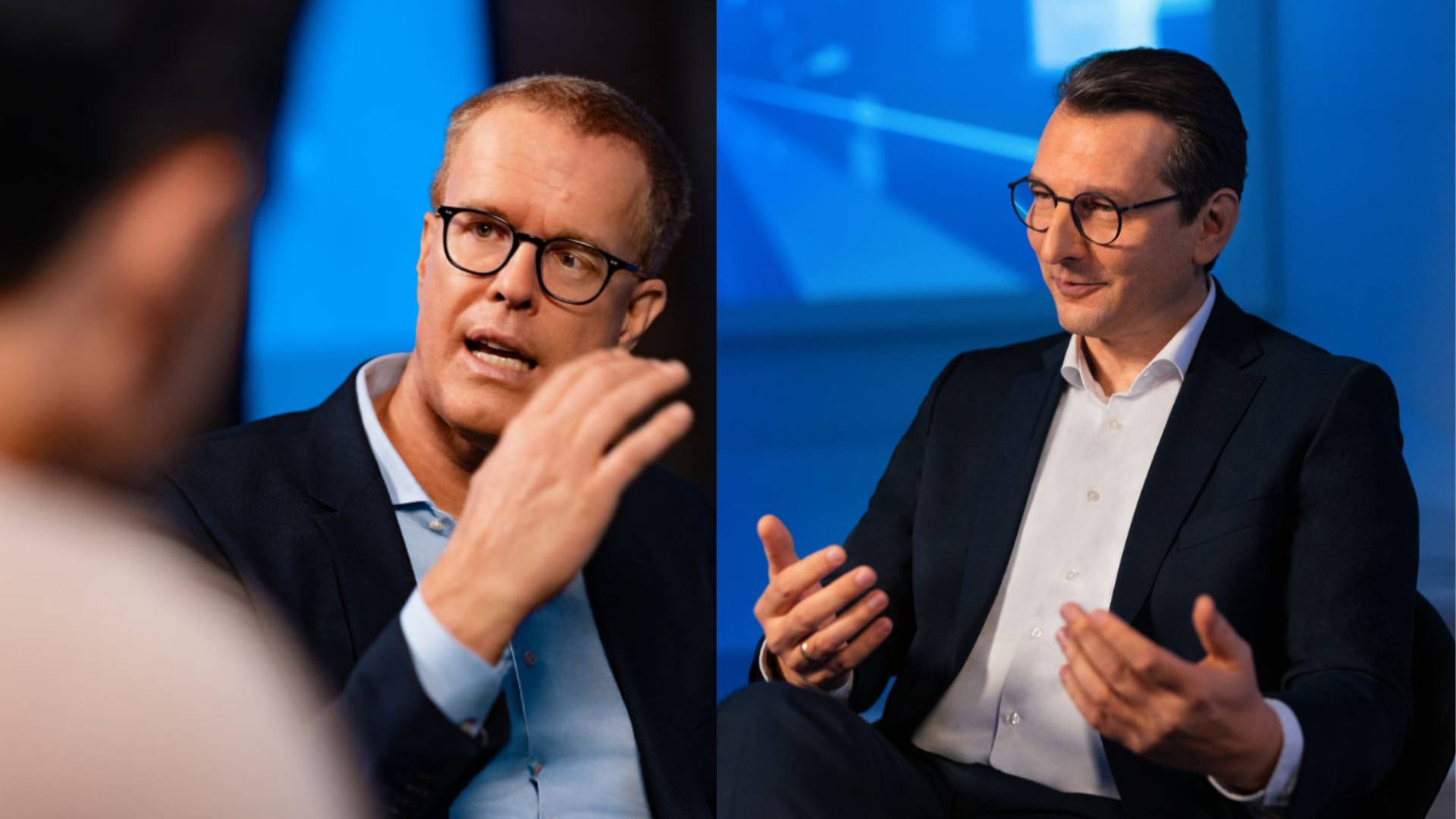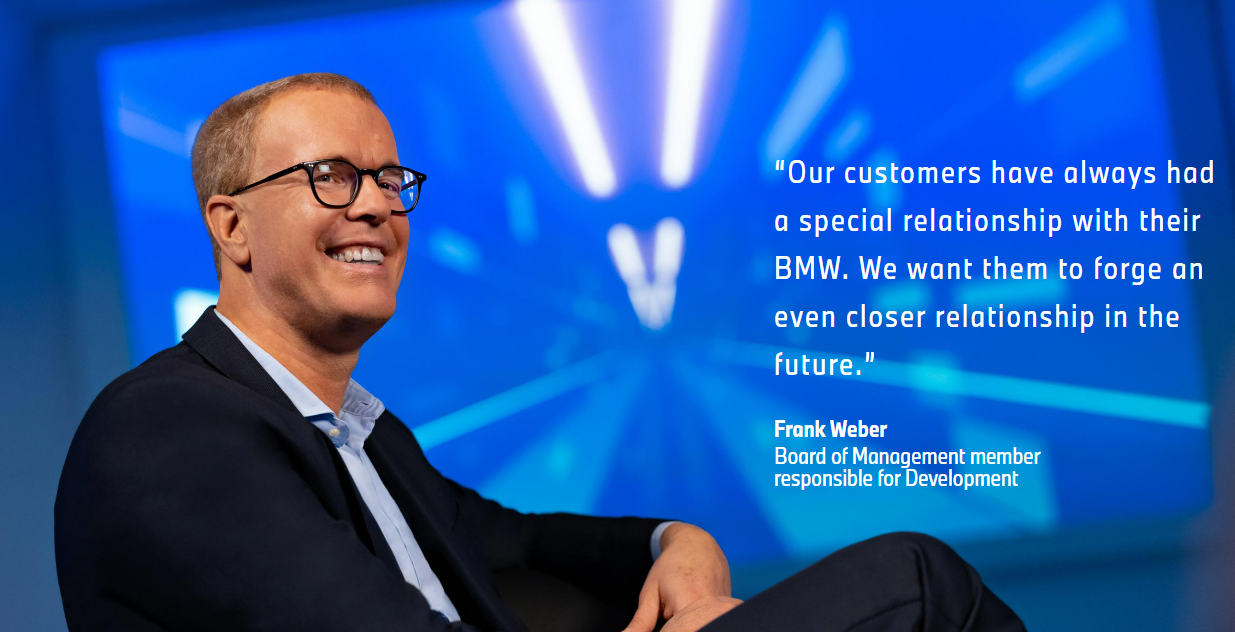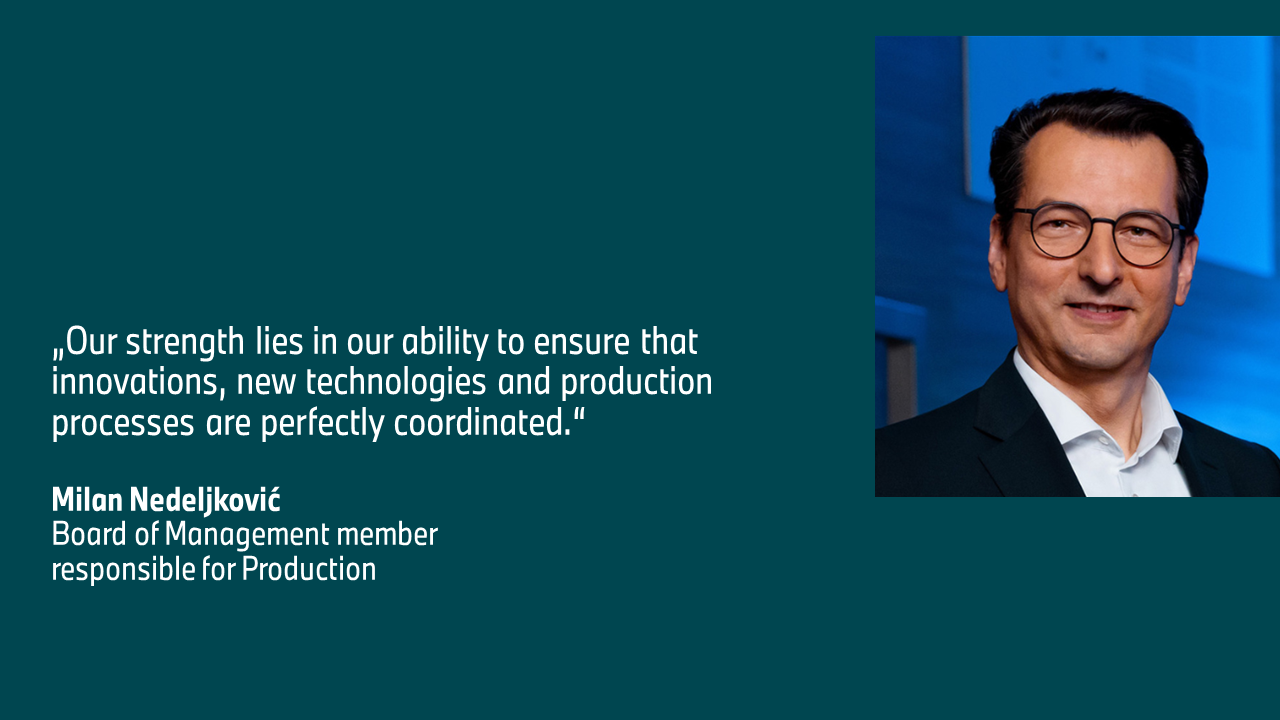
14.04.2023
The Neue Klasse: Next Level Mobility
What are the technological innovations behind the vehicles and in production? An interview with Frank Weber, the Board of Management member responsible for Development, and Milan Nedeljković, the Board of Management member responsible for Production
Mr Weber, you are responsible for the Development division, and Mr Nedeljković, you are responsible for Production. What does your collaboration look like: one of you develops the car and then the other builds it?
Frank Weber: If this were our chosen structure, we would not end up with outstanding products. No, our cooperation starts with the initial idea for a concept and ends more than a decade later when the vehicle has been discontinued. We make all decisions in joint committees. The best example is the next-generation high-voltage storage concept – this sort of challenge can only be mastered if the product and production concept are aligned with each other. And the same obviously goes for prototyping.
Milan Nedeljković: … and that is why prototype production is assigned directly to the Research and Innovation Centre. You cannot get a closer link than that. Our strength lies in our ability to ensure that innovations, new technologies and production processes are perfectly coordinated.
This process starts when the initial vehicle features are designed and continues throughout the entire development process up to the start of series production. The first assemblies and production steps are created in the digital realm before they become a physical reality. It’s connected engineering at its best.

The BMW Group is aiming to take mobility to a new level. What’s the thinking behind that?
Milan Nedeljković: We are working on a whole host of topics that are all interconnected – for example, efficient drive technologies, a charging infrastructure that uses green electricity and, of course, the digitalisation and connectivity of our vehicles. Our emphasis is on sustainability and circularity throughout the value chain, from the raw materials to recycling. This means that we are taking a holistic view of mobility.
How will this affect how you drive your BMW?
Frank Weber: This is by no means just about driving. Our customers have always had a special relationship with their BMW. We want them to forge an even closer relationship in the future. And we are seeking to achieve this by doing an even better job of merging the physical and digital experience: unique driving dynamics combined with ground-breaking entertainment and maximum digitalisation.
What can we expect from the NEUE KLASSE, which is set to be launched in 2025, Mr Weber?
Frank Weber: The NEUE KLASSE is the fundamentally novel technology platform on which BMW’s all-electric models will be based. It will set new standards in terms of drivetrain and efficiency, digitalisation and sustainability. One key component in the drivetrain of the future is the battery cell, featuring our brand-new large cylindrical cells. We’ll be using them for the first time in the NEUE KLASSE. This is the result of ten years of fundamental and intensive research work.
What are the distingwishing features of the new generation of BMW battery cells?
Frank Weber: We have long-standing expertise in cell technology, in-depth knowledge down to the molecular level. Our customers will benefit from this expertise. The new cylindrical cells will allow our vehicles to achieve around 30% more range and will also reduce the charging time by as much as 30%. The NEUE KLASSE will also allow us to hit the sustainability targets we have made a commitment to: 40% less COz per vehicle from 2030 at the latest compared to 2019 – throughout the entire life cycle.

Does that mean that the NEUE KLASSE will be, or even has to be, produced differently, Mr Nedeljković?
Milan Nedeljković: We have indeed been presented with a unique opportunity to completely rethink and revamp our production processes. Our master plan for the production of the future is the BMW iFACTORY. We are focusing on efficient and flexible structures and processes, resource-efficient production and end-to-end digitalisation. This will allow us to systematically enhance the entire production network within the BMW Group.
Can you be a bit more specific about that?
Milan Nedeljković: Every single one of our plants in Europe and China can already produce fully electric vehicles today. The next locations in the network are ready to get started. We are using our flexibility to integrate the all-electric models into our existing structures. At the same time, we are gradually expanding high-voltage battery production at our various locations and are already preparing for the next generation.
We have already used 3D scans to capture digital information at our plants – a process that is almost complete – which gives us a solid foundation for integrating e-mobility into existing structures. The NEUE KLASSE is already rolling off the virtual production line today. This sets us apart from our competitors.
Let’s get back to the special features of the NEUE KLASSE. Mr Weber, you mentioned new standards in terms of digitalisation. Can you give us a bit more detail?
Frank Weber: The NEUE KLASSE will offer a new and unprecedented emotional experience. We will be equipping our vehicles with powerful digital features that use rapid remote software upgrades to constantly make our products better and better. Ultimately, we will be offering outstanding human-machine interaction, as we showcased earlier this year – naturally in exaggerated form – with our visionary BMW i Vision Dee vehicle.
So the BMW i Vision Dee is a concrete source of inspiration for the NEUE KLASSE?
Frank Weber: Most definitely. The best example of this is the mixed reality slider in conjunction with the head-up display of the future. Step by step, the windscreen will be enriched with real-time AR and VR data. This will make your journey more interesting and at the same time safer, and you can make better use of time spent in the car. The BMW Panoramic Vision, for example, which we have developed based on the BMW i Vision Dee and will be launching with the NEUE KLASSE, offers an impressive projection of digital information across the full width of the windscreen.

Sustainability is also a top priority for the BMW Group. What would you say are the most important milestones in the near future?
Milan Nedeljković: First of all, sustainability is not an end in itself, but rather ensures our company’s future viability. Sustainability has always been a firm component of our production philosophy. As I mentioned earlier, we take a holistic approach, for example when it comes to minimising the use of resources or designing supply chains responsibly.
We also try to tap into local potential and identify suitable renewable energy sources. We are already using biomethane in Spartanburg and South Africa, solar power in Mexico, Oxford and other locations, and wind power in Leipzig, where we are also piloting the use of hydrogen in the paint shop. And at our new plant in Debrecen, we will be producing our vehicles without making use of fossil fuels.
Frank Weber: Sustainability is a key driving force for us. Electromobility will only be a success story if all aspects of it are sustainable – and that means far more than just driving electric vehicles. This will involve outstanding innovative products, but also affordable green electricity for driving and production, sustainably sourced and affordable raw materials, and closed-loop recycling processes. And adequate public charging infrastructure is another absolute must. This is an area that requires clearer and faster action by all parties involved. E-mobility as a whole will not be successful until each of these factors works individually.
Interested in more Next Level Stories of the BMW Group? Discover Next Level Production.